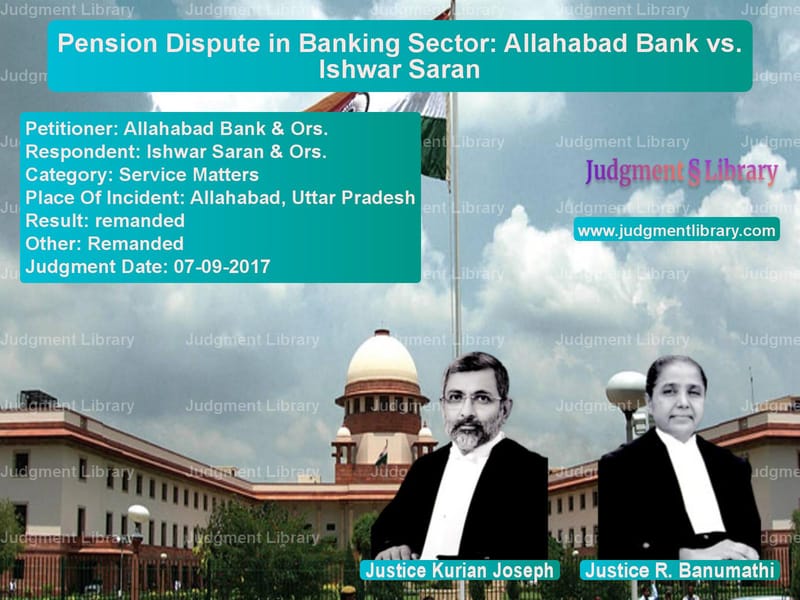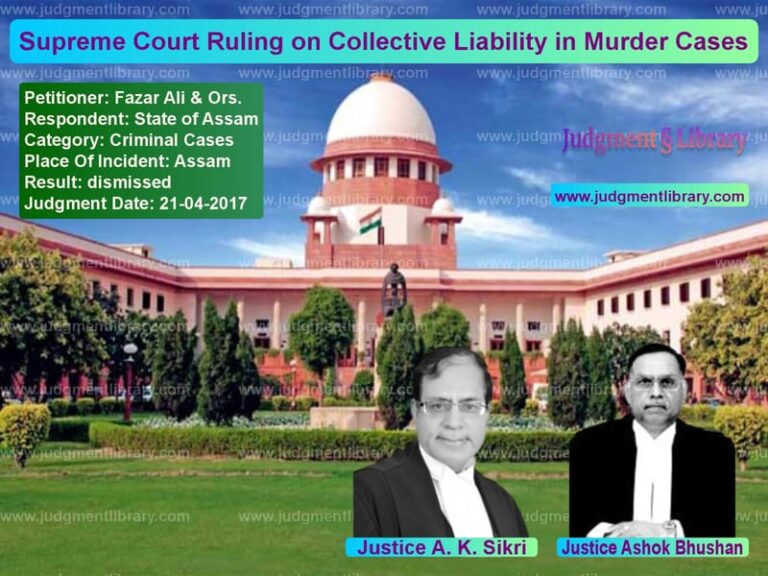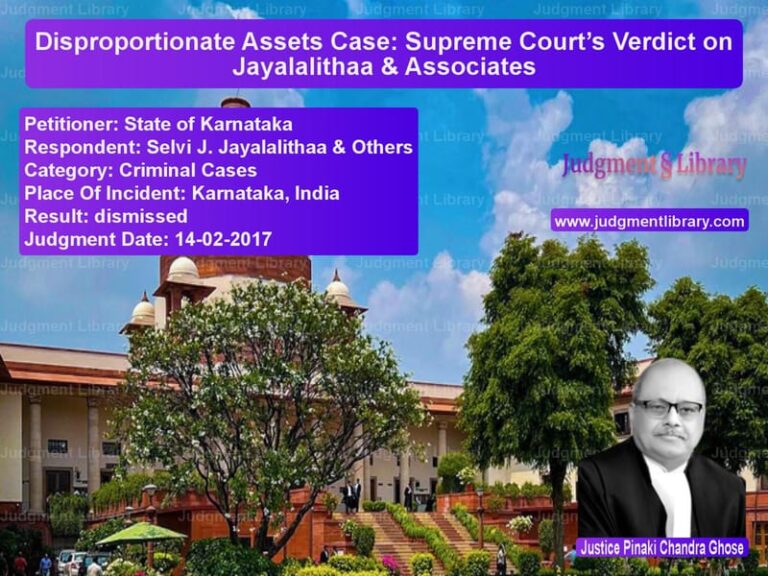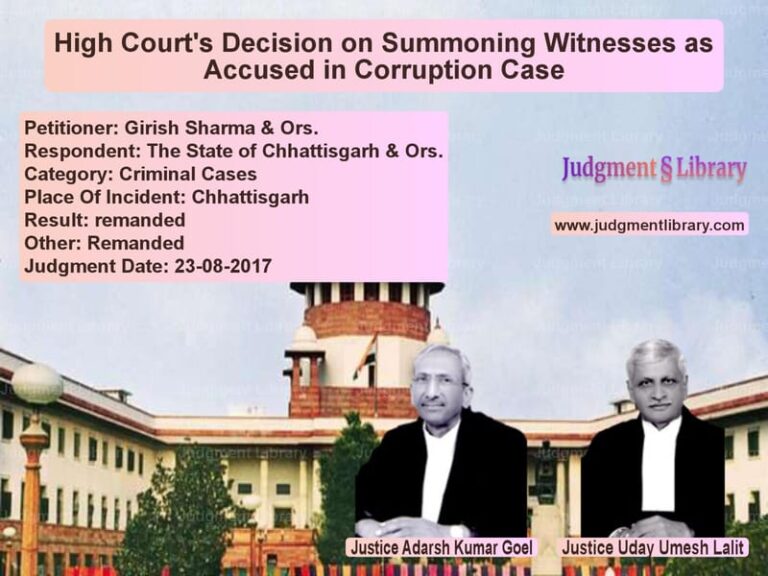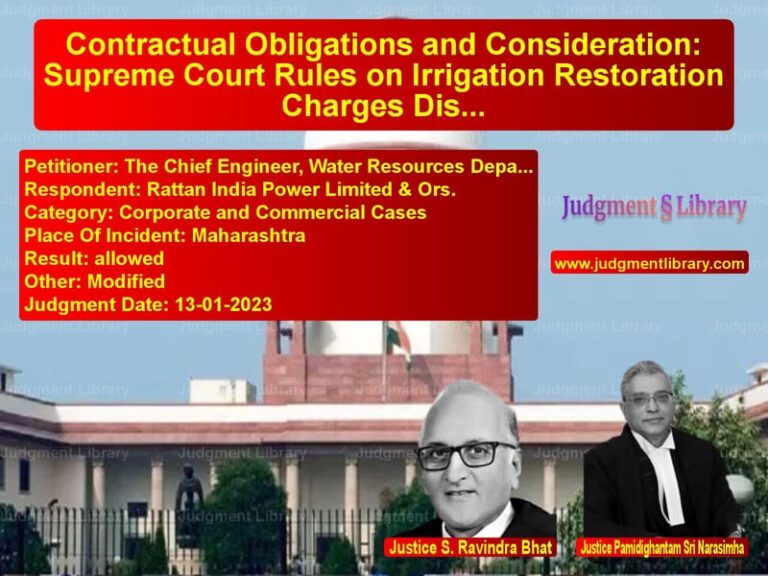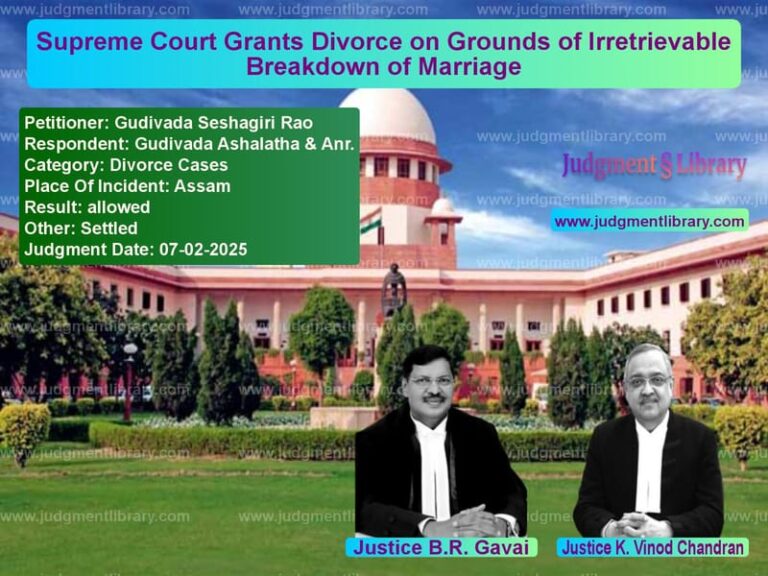Pension Dispute in Banking Sector: Allahabad Bank vs. Ishwar Saran
The case of Allahabad Bank & Ors. vs. Ishwar Saran & Ors. pertains to a significant legal dispute concerning pension entitlements of bank employees under the Allahabad Bank (Employees) Pension Regulation, 1995. The Supreme Court was tasked with determining whether the respondents, who had exercised their option under the 2010 pension scheme, were still entitled to benefits under the 1995 pension regulations.
The issue arose when the respondents, former employees of Allahabad Bank, approached the High Court seeking directions for pension payments under the 1995 scheme, arguing that they had either exercised their option belatedly or were under duress when opting for the 2010 scheme.
Background of the Case
The respondents, who were employees of Allahabad Bank, contended that they were entitled to receive pension under the 1995 scheme. However, the bank refused their claims, arguing that:
- The respondents had failed to exercise their option for the 1995 scheme within the stipulated timeframe.
- They had opted for the 2010 pension scheme, under which they were already receiving pension benefits.
- The High Court had incorrectly relied on earlier judgments that were not applicable to the present case.
The High Court ruled in favor of the respondents, relying on two earlier decisions dated 5th October 2005 and 18th May 2007. Dissatisfied with this decision, Allahabad Bank filed an appeal before the Supreme Court.
Legal Issues
The key legal questions in this case included:
- Were the respondents eligible for pension benefits under the 1995 scheme?
- Did the respondents waive their rights under the 1995 scheme by opting for the 2010 scheme?
- Did the High Court err in deciding the case based on earlier judgments without considering the specific facts of the present case?
Arguments by the Appellants (Allahabad Bank)
The bank presented the following arguments:
- The 1995 pension scheme required employees to exercise their option within the prescribed timeframe, which the respondents had failed to do.
- The respondents had voluntarily opted for the 2010 scheme, under which they were already receiving pension.
- The High Court had not examined the factual and legal issues in depth and had simply relied on past judgments.
- The bank’s financial obligations would be adversely affected if multiple pension schemes were allowed to run concurrently.
Arguments by the Respondents (Employees)
The respondents countered the bank’s claims with the following arguments:
- They had exercised their option belatedly but were still entitled to the 1995 scheme benefits.
- Their consent for the 2010 scheme was given under protest and was not a voluntary waiver of their rights under the 1995 scheme.
- Past High Court rulings had established that employees in similar situations were entitled to pension benefits under the 1995 scheme.
Observations of the Supreme Court
The Supreme Court critically analyzed the procedural aspects and legal arguments in the case. The Court observed:
‘Having regard to the serious disputed issues in the case and the contentions raised by the parties, we are of the view that the matter needs to be remitted to the High Court so as to enable the High Court to consider the matter on merits.’
The Court further held:
‘The High Court has not gone into any of these aspects and several other contentions available to both the parties, apparently for the reason that the High Court chose to rely upon two earlier orders.’
The Supreme Court emphasized that the High Court must independently evaluate whether the respondents had any legal right to claim benefits under the 1995 pension scheme despite opting for the 2010 scheme.
Final Judgment
The Supreme Court set aside the High Court’s ruling and remitted the case back for reconsideration, stating:
- The High Court must thoroughly examine all legal and factual aspects of the case.
- The applicability of past judgments to the present case must be independently determined.
- The High Court should dispose of the matter expeditiously, preferably within six months.
The Court clarified that it had consciously refrained from making any findings on the merits, leaving all contentions open for determination by the High Court.
Impact of the Judgment
This ruling underscores the importance of ensuring a thorough examination of complex legal disputes involving pension entitlements. The Supreme Court’s decision highlights:
- The need for judicial scrutiny in cases involving pension rights, particularly when multiple schemes are involved.
- The necessity of independent adjudication rather than relying solely on past precedents.
- The financial and administrative implications of pension-related disputes on banking institutions.
Conclusion
The Supreme Court’s ruling in Allahabad Bank vs. Ishwar Saran reaffirms the principle that pension disputes must be adjudicated based on a detailed evaluation of facts and law. By remanding the case back to the High Court, the Court has ensured that the rights of the employees and the obligations of the bank are assessed fairly, setting a precedent for similar cases in the future.
Don’t miss out on the full details! Download the complete judgment in PDF format below and gain valuable insights instantly!
Download Judgment: Allahabad Bank & Ors vs Ishwar Saran & Ors. Supreme Court of India Judgment Dated 07-09-2017.pdf
Direct Downlaod Judgment: Direct downlaod this Judgment
See all petitions in Pension and Gratuity
See all petitions in Public Sector Employees
See all petitions in Employment Disputes
See all petitions in Judgment by Kurian Joseph
See all petitions in Judgment by R. Banumathi
See all petitions in Remanded
See all petitions in Remanded
See all petitions in supreme court of India judgments September 2017
See all petitions in 2017 judgments
See all posts in Service Matters Category
See all allowed petitions in Service Matters Category
See all Dismissed petitions in Service Matters Category
See all partially allowed petitions in Service Matters Category

